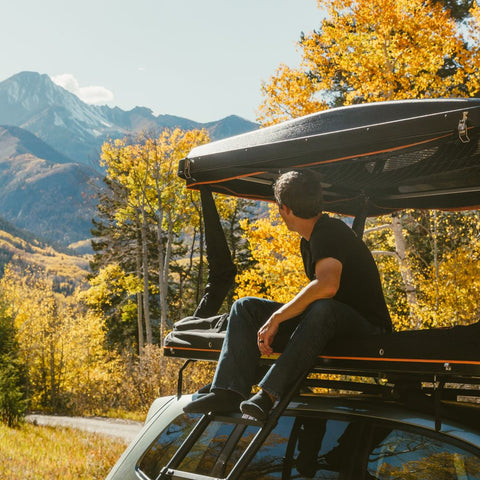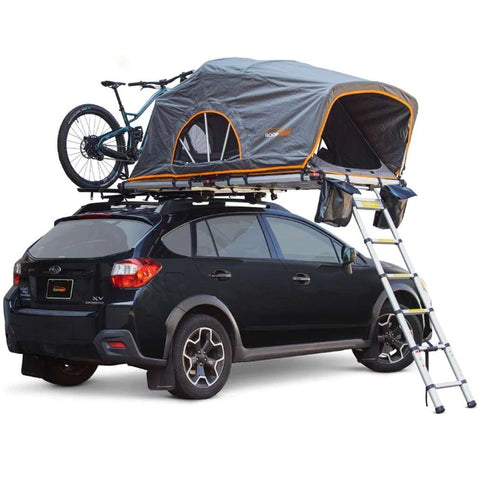7 Best Roof Top Tents for 2026 [Review]
Roof Top Tents for Sale
Looking to buy a roof top tent? We're here to help!
We are experts on every roof top tent on the market today. We're also brutally honest (some would say to a fault), and will shoot you straight.
We know this is a big purchase, and our reputation depends on you feeling good about it after you've made it.
To help people find the best roof top tent for them, we write guides like this one.
If you already know you want a hard shell roof top tent, check out our more specific guide of the best hard shell roof top tents, including recommendations based on size, weight, price, and more. Or, if you're set on a soft shell tent, check out our guide on the best soft shell roof top tents, with similar options.
And if you have no idea what hard shell vs. soft shell means, or where to even begin, then read on, as this guide breaks everything down.

Top Roof Top Tents of 2026
| At a Glance
OVS Nomadic 3 Extended
Best Soft Shell Roof Top Tent
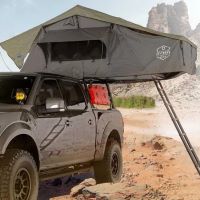
$1,399
The features and value of the Overland Vehicle Systems Nomadic 3 Extended Roof Top Tent are unbeatable.
Learn MoreRoofnest Condor 2
Best Hard Shell Roof Top Tent
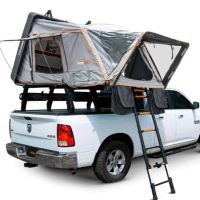
$3,545
The Condor 2 is one of the most versatile and functional tents on the market and has earned our rating of best overall hard shell rooftop tent.
Learn MoreOverland Jct. Golden
Best Views Roof Top Tent
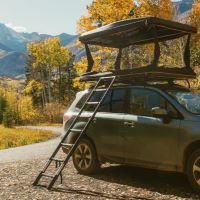
$2,699
The Overland Junction Golden has unmatched 360-degree views, plus strong materials and a luxurious mattress.
Learn MoreFSR High Country
Best Premium Roof Top Tent
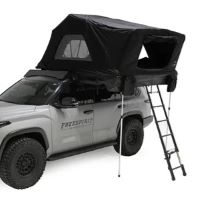
$3,495
The Freespirit High Country V2 - King is a fusion between soft shell and hard shell, with the best of both.
Learn MoreOVS TMBK
Best Affordable Roof Top Tent
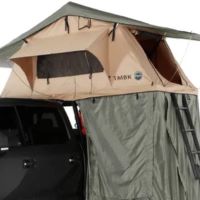
$999
The TMBK is a high-quality tent that is amazingly, shockingly, surprisingly less than $1,000.
Learn MoreMeadowlark
Best Lightweight Roof Top Tent
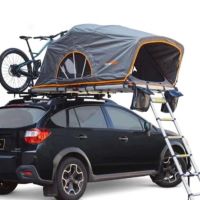
$1,595
The Roofnest Meadowlark weighs in at just 90 lbs, one of the only less-than-100-pound tents on the market.
Learn MoreTable of Contents
(Click the link to jump ahead)
Strong materials, great mattress, unbeatable price.
The number one question we get from existing Nomadic 3 owners is: Why didn't I buy this tent sooner?!?
The number one question we get from potential Nomadic 3 owners is: Why is this tent so inexpensive - seems too good to be true?!
Well, good news: It's not! The features and value that the Nomadic 3 extended soft shell roof top tent provide are unbeatable.
The Nomadic 3 roof top tent is big enough to sleep 3 people comfortably, and the 3" memory foam mattress is so nice you're going to wish you had it on your bed at home.
The 600D body construction and 420D rainfly of the Nomadic 3 RTT will help you stay warm and comfortable in even the harshest of weather conditions.
And a skylight window is built into the roof which makes the tent even more amazing at night.
Plus, you can add a massive annex to it for even more indoor space - perfect for having a comfortable place to change, or even to sleep additional people or pets.

Easy to install, easy to set up and break down, and very easy to sleep in, the Nomadic 3 extended has been our best soft shell tent recommendation two years in a row.

Pros
- Large sleeping area with the option of adding extra space with an annex.
- 3" mattress makes you feel like you're at home.
- Setup and takedown are straightforward.
- Skylight is great for views and star gazing.
Cons
- At 165 lbs, it's on the heavier end for a 3-person soft shell.
Premium design, upgraded materials, tons of options.
The Condor 2 by Roofnest is one of the most versatile and functional roof top tents on the market and it has earned our 2026 rating of best overall hardshell rooftop tent.
First and foremost, the Roofnest Condor 2 has lots of sleeping space - whichever size you go with.
As for materials, it is made of 320 GSM poly-cotton canvas, has a poly-oxford rainfly (waterproof 3000mm), and has an ASA/ABS plastic shell.
Additional upgrades include 2 HVAC ports for climate or cord control, 3 dimmable LEDs (interior and exterior), a six pocket gear-grid, updated 3-way windows, and heavy duty lockable latches.
The Condor 2 is compatible with Roofnest's 6 Channel Crossbars, which attach directly to the shell for easily mounting more gear.

And if you need extra space or a private room, the Roofnest Condor 2 offers the option to add Roofnest's modular Awnex: Awning + Annex system. The Awnex can be configured in multiple ways - with its awning, wall, and floor kits - to offer optimal protection from the elements.
An ideal companion to any vehicle, the Roofnest Condor 2 has options for queen-sized and nearly-king-sized sleeping areas, and includes everything you need for adventures in any environment.

Pros
- Large sleeping area with the option of adding extra space if needed via the modular Awnex system.
- Setup and takedown are really simple.
- Body construction is extremely tough.
- The optional crossbars ensure you can take all the gear you need.
Cons
- The XL version is on the heavier end.
Unmatched 360-degree views.
There are tents that claim to have 360-degree views. And there is the Overland Junction Golden.
Designed and tested at 9,000' in the Colorado Rockies, the Overland Junction Golden Roof Top Tent has four extremely versatile modes.
They let you go between camping in the complete open air, to staying warm and cozy when the weather turns nasty.
Fully closed: With thick, dark fabric and insane water-proofing (5000mm) you'll sleep great no matter what the weather is outside.
Windows and doors: For your standard pop-up tent set-up, the Golden Roof Top Tent lets you open a door on both of the long sides and a window on both of the short sides.
Fully open with mesh: Want complete, 360 degree views while still maintaining bug protection? Drop the walls and keep the mesh up, for an unbeatable open-air camping experience.

Fully open, period: No walls, no mesh, just you and the elements. If you're blessed to camp where the bugs don't, this will be the best camping experience of your life.

Pros
- Unbeatable 360-degree views.
- High quality body fabric and waterproofing for extreme protection.
- Super comfortable 2.75" mattress.
- Extremely fast setup.
Cons
- Limited add-ons like an annex.

Great features, light on your wallet.
The TMBK by Overland Vehicle Systems is a high-quality, soft shell tent that is amazingly - shockingly - less than $1,000.
It's made with tough and durable fabric - 600D for the body, 420D for the rainfly, and 1000g for the cover. No matter what mother nature throws your way, you'll be comfortable in any season.
It also has a 2.5" foam mattress that will keep you comfortable throughout the night.
And despite the thick fabrics and mattress, the tent comes in at just 110 lbs., one of the lightest tents on the market.
While the tent is officially a 2-person, at a generous 55" wide you can comfortably get a family of three inside.
Plus, you have the option to add an annex for additional space for sleeping, storage, or pets.

Did we mention it's a head-scratcher that this tent is only $999 given all these features?

Pros
- Durable body construction with all-weather protection.
- Lightweight at only 110 lbs.
- Solid 2.5" mattress.
- As affordable as it gets for a high quality tent.
Cons
- Not the fastest set up and take down.

All the comfort without the weight.
The Roofnest Meadowlark weighs in at just 90 lbs, one of the only less-than-100-pound tents on the market.
This soft shell tent is the perfect solution for adventurers who want a high quality tent but don't want to haul the extra weight.
The Roofnest Meadowlark soft shell roof top tent has a high-quality, 190gsm tent fabric design and includes a 210D rainfly.
The Meadowlark also boasts a 2.5" mattress, ensuring you're comfortable throughout the night.
On top of all that, the simplicity of the Roofnest Meadowlark also makes it one of the fastest tents to set up and take down.
And because it's so lightweight, it is easy to install on almost any factory-issued car or truck roof rack - as long as you have crossbars you'll be good to go.
Whether you're on an extended adventure, or just stopping for a quick rest along the way, the Meadowlark soft shell roof top tent is sure to provide you with a comfortable, safe, and enjoyable experience.


Pros
- It's hard to overstate how light 90 lbs. is in the roof top tent world.
- Set up and take down are lightning quick.
- Despite the light weight, the tent delivers with a 2.5" mattress.
Cons
- To get to 90 lbs. you have to slim down in some places: the tent is a little smaller and uses lighter-weight materials than many other 2-person tents on the market.
All the comfort without the weight.
The Freespirit Aspen Lite weighs in at just 100 lbs. And yet somehow (well actually, because of Freespirit's diligent updates), it has the best mattress around.
The Aspen Lite tents come with the all new 3" AirCore mattress. Freespirit has had this mattress for a few years, but it's new that they include it as the default mattress, rather than as an add-on.
And boy are we glad they did! Not only is the mattress the most comfortable on the market, it also easily deflates and inflates, letting you have extra space to store gear when not using your tent.
The Freespirit Aspen Lite also has an extruded aluminum frame, is made with a heavy duty 150D Poly-Oxford fabric, and is designed to keep you comfortable in all weather conditions.
Plus, all the windows include mesh screens to prevent insects from disturbing your sleep at night.
And finally, the Freespirit Recreation Aspen Lite boasts lightning quick setup, integrated LEDs, and a telescoping ladder.

Whether you’re on an overlanding adventure, or just stopping for a quick rest along the way, the Freespirit Aspen Lite roof top tents are sure to provide you with a comfortable, safe, and enjoyable experience.

Pros
- Unbeatable mattress.
- Setup and take down is lightning quick.
- Tri-layer technology keeps you comfortable no matter the weather.
- Low profile and lightweight design.
Cons
- Light of course means smaller - 45"W is on the thinner end for a 2-person.
Hard Shell vs. Soft Shell Roof Top Tents
We think all roof top tents are great. Hard shell roof top tents and soft shell roof top tents both serve their purpose, and if your mind is already made up, check out our more specific guides on the best hard shell roof top tents and the best soft shell roof top tents.
The biggest differences you'll hear are that hard shell tents are more durable, more aerodynamic, and easier to set up, while soft shell tents are lighter and more affordable.
We generally agree, but we like to dive deeper than that, so let's dig in:
- The Cover – This is what the names are referring to.
- Hard shell roof top tents have a hard shell - a plastic or aluminum cover that looks like the Thule cargo cases you're used to seeing on top of cars.
- Soft shell tents have a canvas (think thick tarp) cover.
- Durability – The cover is really the difference maker here.
- Plastic or metal covers will simply hold up longer than canvas ones. Canvas ones sometimes rip or fray with time, exposing the tent to potential further damage.
- Plastic and metal ones get dinged up with time, but rarely in a way that puts the tent itself at risk.
- Significant damage to either is rare, so this isn't the first (or second or third) thing we'd worry about. But it's a difference.
- Let's call that a half point for hard shell.
- Aerodynamics – This again comes back to cover.
- Hard shell tents have the advantage that the shell can be styled to be aerodynamic, whereas the soft shell tents always form a sort of square, which needs to be strapped down carefully to minimize drag and noise on the road.
- Hard shell tents are often - but not always - lower profile as well. This means that they might be 8-12 inches above the top of your car, whereas soft shell tents are more like 10-14 inches.
- All of this means that the soft shell tents cause more drag, which reduces your MPG. If you're doing a cross country road trip, you'll notice the difference (probably 2-3 MPG difference which adds up over thousands of miles). If you're going camping a few hours away a few times a year, you probably won't.
- We'll call this a point for the hard shell, so hard shell is up 1.5.
- Setup and Takedown – Most hard shell tents use gas struts, which enable the tent to pop up or out in seconds. You basically release the straps, give the edges a little push, and your tent is open.
- Soft shell tents, on the other hand, require releasing the straps and then some sweat equity - often extending the ladder and leveraging it to pull the tent open.
- On average, you're talking about one minute to fully set up a hard shell tent, and 3-5 to fully set up a soft shell tent. While both are faster than a ground tent, any work when it's on the roof of your car can pose challenges (a lot of tiptoe reaching!).
- So, we give a full point to the hard shell here, for a 2.5 point lead.
- Comfort – Many used to argue that hard shell tents were also more comfortable. We think this is outdated. At this point, all of the highest quality soft shell and hard shell tents use comparable tent and rainfly fabrics, comparable mattress thickness, and comparable venting and bases.
- We call comfort a draw. Hard shell still up 2.5 points.
- Crossbars– The final clear advantage for hard shell tents is their ability to take crossbars on top.
- Many (but not all) hard shell tents allow you to mount crossbars to the top of your tent (similar to the ones on top of your car that you're mounting the tent itself to).
- This allows you to put things on top of your tent that you might otherwise have put on your roof if the tent hadn't been there. Things like kayaks, bikes, or other gear. On long trips with a full car and a desire to bring other gear, this is a game changer.
- In reality, though, most of our customers don't use these. The optional crossbars sit unbought in our warehouse.
- So we'll call this a half point advantage as well. Hard shell tents +3.
- Weight – On average, soft shell tents are lighter than hard shell tents.
- It's pretty simple: what's lighter, a 4' x 6' piece of canvas or a 4' x 6' piece of metal. Obviously the canvas, and thus the weight difference.
- The first time you'll notice this is on installation. Everything about installation is easier with a soft shell tent because you're managing less weight.
- If you're thinking you might want to take the tent off in the winter, or when you need to haul your Christmas tree or pop the Thule on top, weight again matters.
- Having a lighter tent also means less gradual wear and tear on the roof rack, roof of the car, and car itself.
- Finally, many roof racks simply can't handle the weight of a heavier, hard shell tent. Most roof racks can handle most soft shell tents. But if you want to go hard shell, you may be looking at buying a new roof rack or cross bars too.
- This one is therefore a full point for team soft shell, reducing the hard shell lead to +2.
- Cost – Which brings us to the final - and for many people, the most important - element...cost.
- Up to this point, hard shell tents hold a 2 point advantage. If money is no object on your roof top tent purchase, we recommend hard shell without reservation.
- But the cost of roof top tents is real! Some run 10x the cost of high quality ground tents. For many people, this is the biggest purchase they'll make after the vehicle they're putting it on and the house it's temporarily replacing.
- And a lot of the hard shell advantages are small - ones that would only add up with time. You probably won't notice a 1 minute set up vs. 3 minutes on your weekend camping trip. But if you're doing it every night for 6 months, you might. Likewise, a ~2MPG difference isn't so big a deal on a couple hour weekend getaway. But on a cross-country road trip, it adds up.
- We usually tell folks: If you plan to use this tent A LOT, getting lots of great trips over many years, then a hard shell is worth the investment if you can afford it. The 2 point lead holds up.
- But if you're thinking a few family camping trips each summer for a couple days each, then cost becomes the most important consideration in our opinion, evaporating the hard shell advantage. And we think, in that case, you will have no regrets going with a high quality soft shell roof top tent.
As we said at the top: We think all roof top tents are great. Pick the one that's right for your adventures, and you won't look back. There are great options for all sizes whether you prefer hard shell or soft shell.
Roof Top Tents FAQs
1. How do I choose the right roof top tent?
If you're trying to pick the right roof top tent, you're in the right place! There are lots of considerations to make when choosing the right roof top tent. Here are some of the most important ones:
- Hard shell vs. soft shell - For starters, you'll want to decide on soft shell vs. hard shell. See above for lots of information on that.
- Vehicle Load Capacity - Can your vehicle handle the weight of your roof top tent? It's important to know what weight you can consider based on what your roof rack can handle. If the weight capacity is too low, you might also need a new roof rack.
- Size - Are you looking for a 1-2 person tent? 3 person? 4 person? 5 person? Roof top tents come in all different sizes, and you'll want to think about how big you want yours to be. It's nice to have plenty of space, but bigger also drives up weight and price.
- Price - What's your budget? There are good options in all price ranges, but all of the factors above (hard shell vs. soft shell, weight, and size) will play an impact on price too.
2. Are roof top tents bad for your car?
In general, roof top tents are not at all bad for your car. You can experience a very slight decrease in MPG when you install your roof top tent on your vehicle. This is mainly because of the extra weight placed on the car and the extra height above the roof that creates additional drag. And that's about it. Car roofs and racks are designed to carry heavy loads - you're just using them as they're made to be used!
3. How long do roof top tents last?
How long a roof top tent lasts depends on use. The typical soft shell roof top tent lasts 5-10 years before seeing some minor (and fixable) damage. The typical hard shell roof top tent will get you even longer under normal use. Of course, if it's sitting on your car in a garage most of the time, that's different than if you're opening it every night on a many-month road trip. But we hope you get to do the second one at some point, and we're confident your tent will hold up great even with lots of use.
4. Are car roof top tents safe?
Roof top tents are far safer than ground tents, because they are elevated off the ground, away from animals and other critters, and they are larger and more heavy duty than typical ground tents.
5. Do roof top tents get moldy?
With normal cleaning and storage, roof top tents do not get moldy. Feel free to reach out to us for tips and tricks!
6. How much weight can a roof top tent support?
How much weight a roof top tent can support depends on the tent. We list the weight capacity on all of our tent product pages, so you know the exact capacity for the specific tent you're looking at. The typical range is 700-900 pounds, so even for a family in a larger tent, most people are good to go.
7. How much does a roof tent cost?
We carry tents that range in price from $999 to $4,000+. Price will depend on hard shell vs. soft shell, size, weight, and features (like annexes, crossbars, skylights, etc.). Check out this guide, our other guides, and our product pages for more info on options.
8. Are all roof top tents the same?
Oh boy, I sure hope all roof top tents aren't the same since I just wrote several thousand words above on the differences between the best ones! But seriously, they aren't. They're similar. They use similar designs, similar fabrics, and have similar features. But because there are so many variables (length, width, height, tent fabric, rainfly fabric, cover material, base material, weight, color, windows, skylights, zipper design, annex, crossbars, LED lights, and on and on) no two tents are exactly the same. We'll try to help you find the best one for you.
9. How long does it take to set up a roof top tent?
On average, it takes 1-5 minutes to set up a roof top tent. Hard shell tents are generally faster than soft shell tents. And then what counts as fully set up drives the rest of the difference. If you get to camp late and just want to get in and sleep, it's actually quite fast (even just 2-3 minutes for soft shells). But if you're looking to hang out, it takes a few more minutes to open all the windows, put all the window rods in, set up the annex if you have one, etc.
In addition to these great questions, we get some REALLY frequent ones about weight capacity and roof racks that deserve more extended answers. Still with me? Here we go!
What Do You Need To Install A Rooftop Tent On Your Vehicle?
You need two things to install a roof top tent on your vehicle: A rack (1) that has cross bars (running from one side of the car to the other) and (2) that can handle the weight.
That's it! All tents come with mounting brackets that work on most crossbars.
Lighter tents will not have any weight issues with most vehicles' factory crossbars, so as long as you meet #1 (you have crossbars), you should be good to go.
But if you don't have crossbars, or you want to go with a larger and heavier tent, here are 3 different types of racks you can use to install a roof top tent on your vehicle:

Crossbars
You see them every day. In addition to original equipment manufacturer (OEM) parts, Yakima, Thule, and Rhino-Rack are a few of the biggest brands that make crossbars. We also carry a great pair from OVS. They range anywhere from $150-$600, and you can find them for almost any vehicle. **If your vehicle came with OEM crossbars, please check the manual for weight limits before mounting a hard shell roof top tent.

Roof Racks
Roof racks are bulkier and are generally more expensive than standard crossbars. They typically range anywhere from $700-$1400, have a weight capacity of 300+ lbs, and allow you to mount other heavy gear when you are not using your hard shell rooftop tent. Check out our roof rack finder quiz to see the perfect roof rack for your vehicle.

Bed Racks
If you own a pickup truck, you'll probably consider using a bed rack to install your hard shell tent. Bed racks, as the name suggests, go on the bed of your truck and typically have a weight capacity of 400+ lbs. These allow you to mount your hard shell roof top tent just like you would on a vehicle with crossbars. Check out our best bed racks guide to find the perfect one for your vehicle.
Can I mount a roof top tent on the factory roof rack my vehicle came with?
It depends on the rack and the tent.
If you only have side rails (that run from the front of the car to the back along either side) you will need to add crossbars.
If you have factory crossbars, then check the weight capacity of that rack in your owner's manual and compare it to the weight of the tent you are interested in.
You are looking at the dynamic weight capacity, which is the weight capacity when you're driving down the highway at 70mph and the wind is trying to rip the tent off the top of your car. You almost certainly don't need to worry about the static weight capacity, which is many hundreds of pounds higher and is when you're in the tent.
Wait, my crossbar capacity is 180 pounds and I weigh 160 pounds. So I can only have a 20 pound tent?
Of course not! You're confusing dynamic weight capacity and static weight capacity, which are easy to confuse, and everyone does, so don't worry about it.
You only need to pay attention to dynamic weight capacity and you can leave yourself out of it. When you're driving down the highway (dynamic), you are hopefully not in the tent. Please don't be in the tent when driving down the highway. Seriously.
That's the weight capacity you need to worry about. It's the one where factory racks usually top out at 150-200 pounds, so some tents are too heavy and require better roof racks.
Where you come into the picture is with the static weight capacity. When you're getting in the tent, the car isn't moving (it's static). Those weight capacities for racks are usually several hundred pounds. And then the roof of the car absorbs a lot of the weight, too, as does the ladder of the tent.
In general, you don't need to worry about static weight capacity or your weight. Just dynamic weight capacity and the tent's weight.
Have Other Questions About Roof Top Tents?
We at Overland Junction can help you make an informed decision on the best roof top tent for your vehicle.
If you have any questions or concerns before making a purchase, please browse our website, or contact us by text or phone at 833-205-7703 or email at support@overlandjunction.com.




